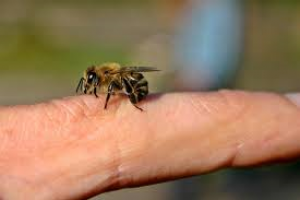HOW TO TREAT HONEY BEE STINGS:
A bee sting is not a major problem until for those who have got an allergy from insect bites.
The very interesting thing about honey bee: Honey bees sting only when they feel threatened, as once it loses its stinger it dies.
So first thing you should do is to scrape out the stinger immediately( Do not try to pull or pluck it out, as you may rupture the sac which will release more venom). It looks like a black dot at the sting site. So prompt removal of the stinger can reduce the severity of the sting. After that clean it with soap and water. Now apply ice water on it for 20 minutes, This will help to relieve the pain and swelling of the affected area. Taking an antihistamine tablet such as alerid, ibuprofen can also provide relief in some of the symptoms.
Home remedies:
Before using one of the remedies below, make sure to thoroughly clean the sting site. If the stinger is still inside your skin, you have to remove it first.
Apply toothpaste on the affected area which will act as an effective base to counter the acidic string. Let it sit there for a few hours. Repeat it if required.
Dabbing honey on the wound and covering it with a gauze for 30 minutes, can prove to be an effective remedy.
Aloe vera: Extract the gel from the aloe vera leaf and apply it to the affected area. It will help in relieving pain.
Basil leaves: Crush up some basil leaves and apply to the site to help relieve pain.
Onion: Apply the slices of the onion on the affected area and keep it there for one hour.
Turmeric: It consists of antibacterial, anti-inflammatory and antiseptic properties that help in preventing swelling and infection. Make a paste of turmeric and water and apply it.
Coconut oil: Apply coconut oil on the affected area. It will protect you from itching.
Point to be noted: Individuals with bee sting allergies should talk to their doctor about taking special precautions.
Attention: Stings in the mouth or nose, even in persons not known to be allergic to bee stings, also require emergency medical attention, since they can lead to swelling that can interfere with breathing.
Reactions to a bee sting:
1) Difficulty in breathing.
Some steps to reduce your risk of a bee sting:
1)Do not walk barefooted.

